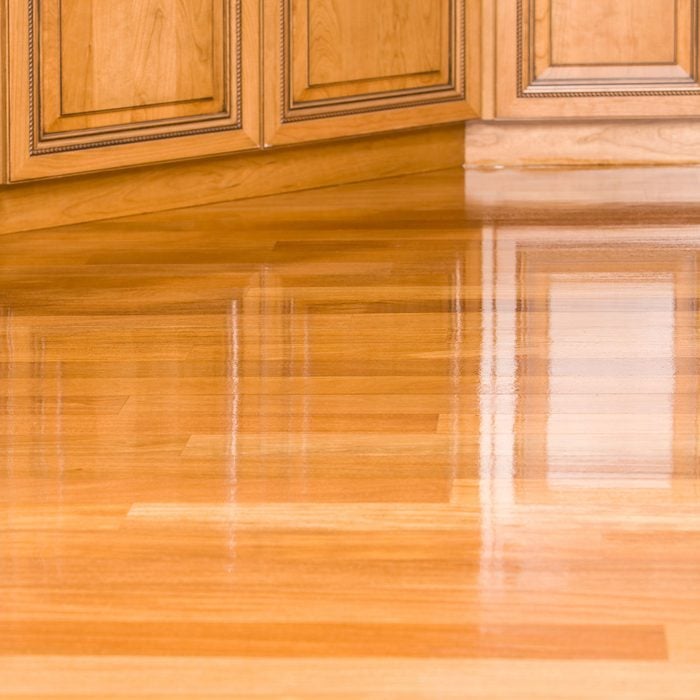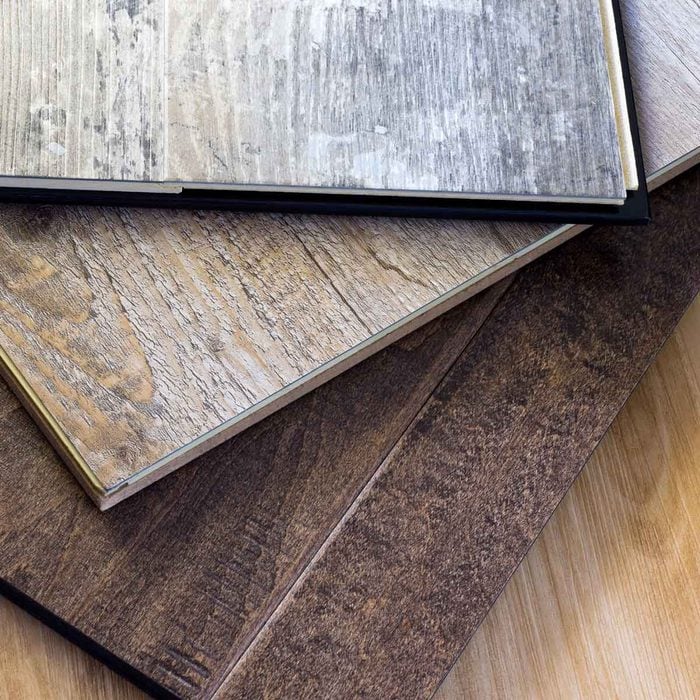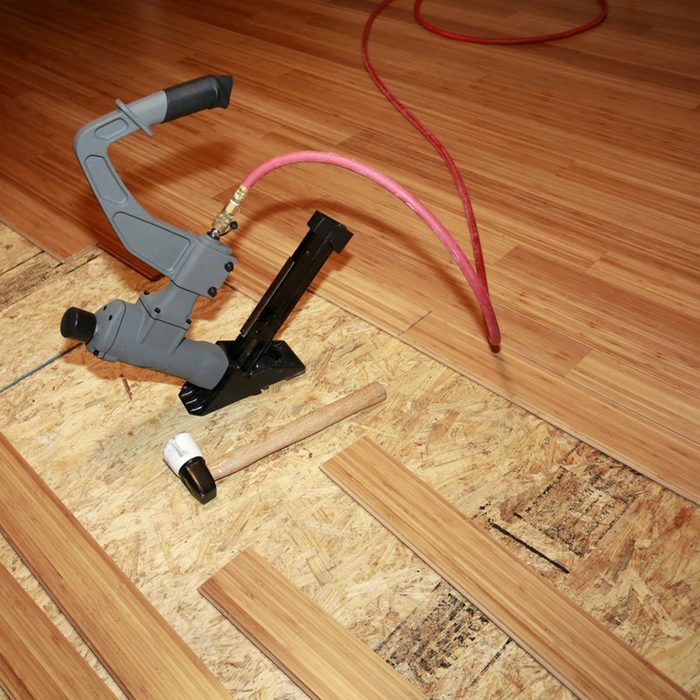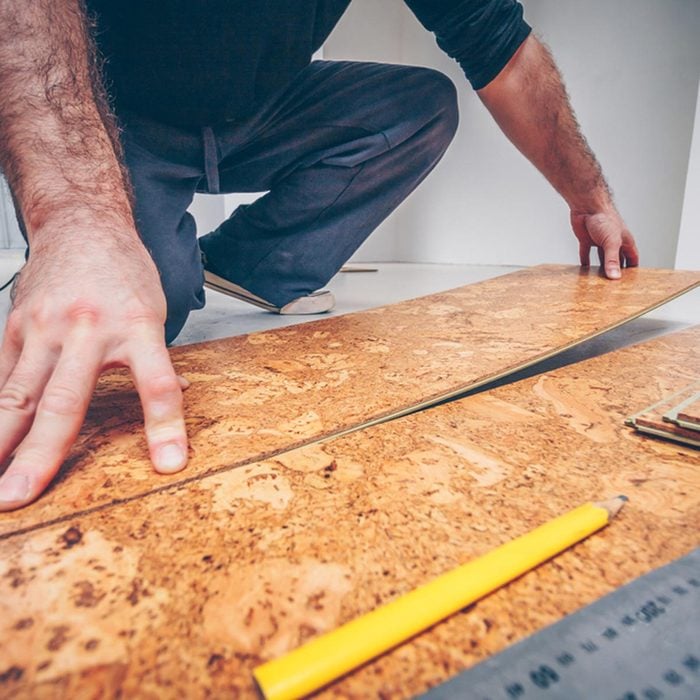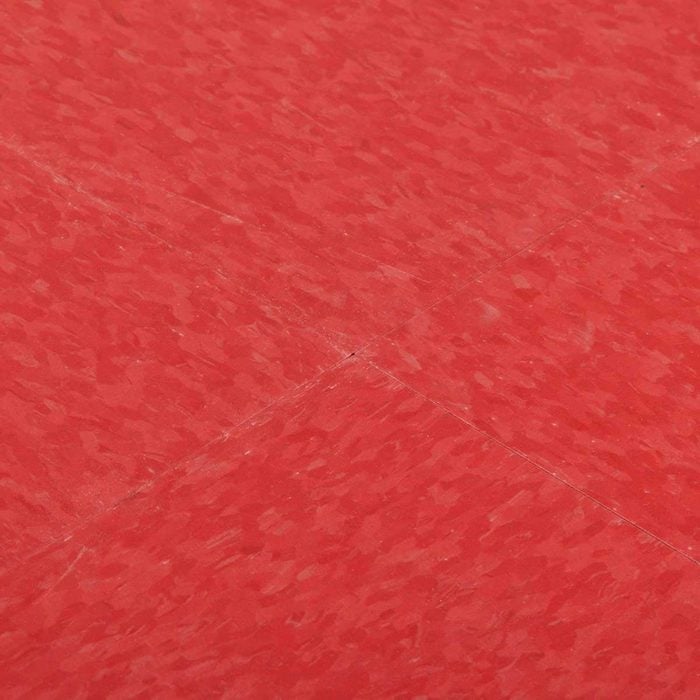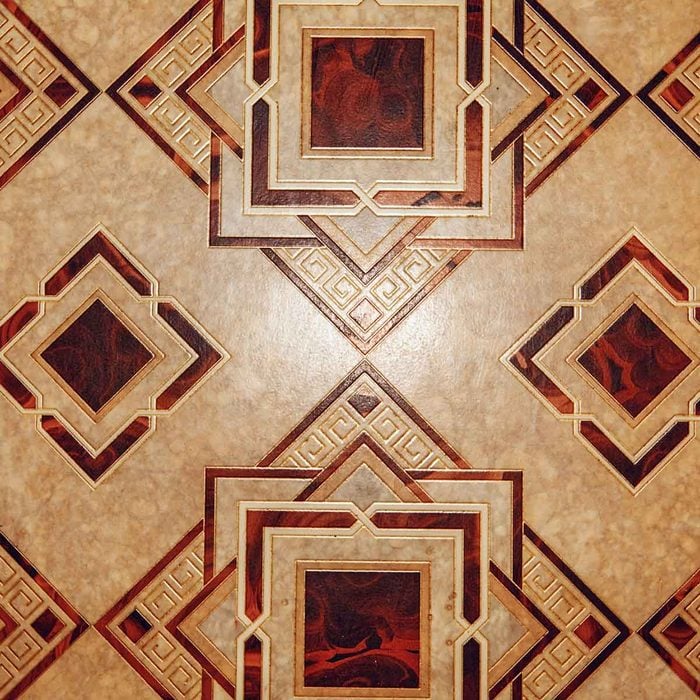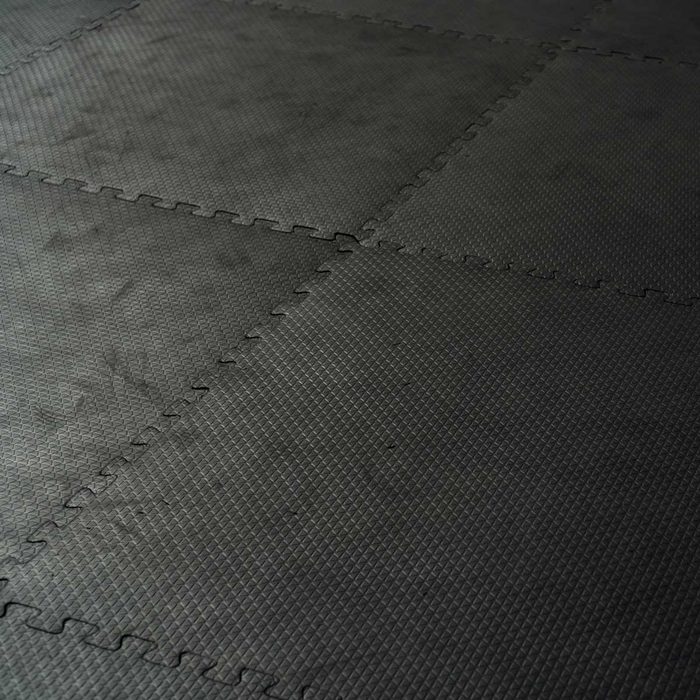Hardwood Flooring
Hardwood flooring gives a room a crisp, classic elegance, while the soft look of natural wood warms any room. It’s available pre-finished or unfinished, and in many species.
Hardwood Flooring Pros
- Long lifespan, when properly maintained;
- Durability depends on species of wood (oak is more durable, pine is less so);
- Readily available;
- Easy to clean;
- Good for DIY;
- Unfinished flooring can be stained to any shade.
Hardwood Flooring Cons
- Needs to be refinished every five to eight years depending on use;
- Can be prone to echoes or noise amplification;
- Can be slick when wet and chilly in cold temperatures.
Hardwood Flooring Cost
$5 to $12 per square foot. Price factors include board width, squares vs. planks and wood species.
Engineered Flooring
Engineered flooring combines a veneer of hardwood over one or two layers of manufactured material, usually high-density fiberboard or plywood. Engineered wood flooring provides the look of hardwood at a reduced price.
Engineered Flooring Pros
- More affordable than hardwood flooring;
- Readily available;
- Easy to clean;
- More environmentally friendly (manufactured layers made of reclaimed material);
- Depending on thickness of veneer, it may or may not be refinished;
- Available as pre-finished or stainable;
- You can DIY this, nail to a wood subfloor or glue on a concrete slab.
Read more about engineered wood, here.
Engineered Flooring Cons
- Slightly less durable — deep gouges may expose layering;
- Needs to be refinished every five to eight years depending on use;
- Limited number of refinishes over the floor’s lifetime, determined by veneer thickness.
Engineered Flooring Cost
$3 to $6.50 per square foot. Price factors include squares vs. planks, plank width, species of veneer layer and thickness of veneer.
Laminate Flooring
Laminate flooring is a pressboard subsurface topped by a treated layer designed to look like wood. Unlike engineered flooring, it does not have an actual hardwood layer. While some laminate flooring can be vulnerable to moisture, there are water-resistant laminate options.
Laminate Flooring Pros
- More affordable than hardwood or engineered flooring;
- Durable against wear and tear — the top “wear” layer on quality laminate can take a lot of abuse;
- Readily available;
- Easy to clean;
- Pre-finished;
- DIY friendly with “floating” options requiring no glue or nails;
- Good lifespan — lasts 10 to 20 years, depending on usage and wear layer;
- Inexpensive way to get wood look.
Laminate Flooring Cons
- Pre-finished designs limit options;
- When damage does get through, it tends to be noticeable — scratches may expose layering;
- Vulnerable to water (use moisture-resistant underlayment if the material will be exposed to moisture);
- Not real wood, so it can’t be refinished or re-stained;
- Doesn’t last as long as hardwood or quality engineered flooring.
Laminate Flooring Cost
$1 to $5 per square foot. Price factors include durability of top “wear” layer, style and water resistance.
Ceramic, Stone or Porcelain Tile Flooring
Most floor tile is ceramic, though materials such as natural stone or porcelain are available. Tile is a great choice for areas that may get wet, such as kitchens, bathrooms or entryways. Some homeowners like tile throughout the house because it’s easy to clean; others avoid tile in living areas because it’s relatively cold and noisy.
Ceramic, Stone or Porcelain Tile Flooring Pros
- Extremely durable and scratch resistant;
- Long lifespan;
- Moderately easy to clean as long as grout and tile remain sealed;
- Readily available;
- Wide variety of sizes and styles available;
- DIY friendly with practice and proper tools.
Ceramic, Stone or Porcelain Tile Flooring Cons
- Individual tiles can be replaced, but not easily;
- If dropped, a heavy item could crack or break a tile;
- Not great for noise reduction;
- Can be chilly on bare feet;
- Depending on finish, can be slick when wet.
Ceramic, Stone or Porcelain Tile Flooring Cost
$1.50 to $15 per square foot. Price factors include size of tile, country of origin, tile material, grout width and type of grout.
Bamboo Flooring
Bamboo flooring is increasingly popular because of its strength and sustainability. Some variations are more resilient than others, including “strand woven” varieties or specially strengthened flooring such as the Fossilized line from Cali Bamboo.
Bamboo Flooring Pros
- Environmentally friendly;
- Extremely durable (up to three times as dense as hardwood);
- Long lifespan;
- Normally comes in pre-stained varieties;
- DIY friendly; installation is similar to hardwood.
Bamboo Flooring Cons
- Might be a special order in some locations;
- Many varieties can be refinished, but not all (be sure to ask);
- Pre-finished stock can limit color options.
Bamboo Flooring Cost
$10 to $13 per square foot for solid bamboo, $2.50 to $6.50 for engineered. Price factors include color, finish style, plank vs. squares, plank width and density.
Concrete Flooring
Wondering what to lay over top of that basement floor? What about just prettying up the concrete itself? Concrete floors are surprisingly attractive when properly stained, sealed or polished. They’re incredibly long-lasting and can add a modern flair.
Most DIYers who are renovating will be looking at staining and sealing existing concrete in areas such as garages, workshops or basements. Those working on new builds can choose any of several concrete finishes during construction.
Concrete Flooring Pros
- Affordable, especially if you’re fixing up existing concrete — no additional flooring to buy, only stains and sealers;
- DIY friendly if fixing up existing; less so if starting from scratch;
- Extremely durable;
- Materials are readily available.
Concrete Flooring Cons
- Echo effect — concrete floors can be noisy;
- Prolonged standing on concrete can cause fatigue;
- Very heavy. If considering adding concrete to an existing home, be sure to consult a pro.
Concrete Flooring Cost (New)
Materials to pour, stain or polish new-build concrete floor range from $4 to $12 per square foot. Price factors include home design, style of stain and pattern intricacy.
Concrete Flooring Costs (Existing)
Materials to stain or seal existing concrete floor range from 30 cents to $2 per square foot. Price factors include style of stain and pattern intricacy.
Cork Flooring
Like bamboo, cork is an environmentally friendly option for flooring. It has the elegance of hardwood, but with a warmer, more inviting look. Cork flooring is available in planks or tiles. Here, find out why you should consider cork flooring for your basement.
Cork Flooring Pros
- Environmentally friendly;
- Reasonably priced;
- DIY friendly.
Cork Flooring Cons
- May require a special order in some locations;
- Less resistant to wear and tear than hardwood or bamboo.
Cork Flooring Cost
$3 to $6 per square foot. Price factors include squares vs. planks, plank width, color and texture.
Carpet
While everyone is familiar with carpet, many homeowners don’t appreciate the range of carpeting options. Modern carpet is available as stick-down squares or large rolls, and in an almost-infinite array of styles, colors and textures. In addition, modern carpet pads last longer and give more cushion than in previous years.
Carpet Pros
- Readily available;
- DIY-friendly options available (rolls are large and hard to maneuver);
- Many styles and colors available to match your home;
- Maintenance cleaning is easily done with a vacuum;
- Much softer than other options.
Carpet Cons
- Repair difficulty varies by color and type of carpet pile;
- Easily stained (especially light colors);
- Deep cleaning requires special equipment;
- Durability — most carpet will need to be replaced in five to 12 years.
Carpet Cost
$2.50 to $9 per square foot (for carpet and pad). Price factors include wall-to-wall vs. squares, natural vs. synthetic fibers, quality of padding and pile (the density and length of fibers).
Vinyl Composition Tile Flooring
Vinyl Composition Tile (VCT) is a robust flooring option. While peel-and-stick vinyl tile is more affordable, it’s ultimately a short-term solution. By contrast, VCT is a long-term flooring option that can be buffed, refinished and sealed, much like hardwood flooring.
VCT Flooring Pros
- Surprisingly durable (color is throughout the tile, so scratches aren’t readily visible);
- Long lifespan — service life up to 40 years;
- If a tile is damaged, it can be replaced;
- Readily available;
- Affordable;
- Environmentally friendly — the long service life requires less to be made, and relatively few fossil fuels are used in its manufacture,
- DIY friendly.
VCT Flooring Cons
- Has an industrial feel — VCT is what you see on the floors in big box stores like Lowe’s or The Home Depot;
- Distinctive look may not fit all spaces.
VCT Flooring Cost
VCT is 60 cents to $1.25 per square foot. Price factors include thickness and color of tile. You’ll also need a sealer and polisher when installing the VCT, as well as a cleaner and potentially stripper for maintenance. That should total around $50 more.
Linoleum Flooring
Once found in millions of homes, sheet linoleum is far less popular today. But it’s still an affordable option, especially for kitchens and entryways. And while the classic linoleum “pebble” look of the ’70s is still available, there are now sheet products that capture the appearance of everything from wood planks to mosaic tiles.
Linoleum Flooring Pros
- Readily available;
- Affordable;
- Resists wear and tear.
Linoleum Flooring Cons
- Deeper gouges and scratches stand out visually;
- Damage is hard to repair and may require replacement;
- Only moderately DIY friendly.
Linoleum Flooring Cost
50 cents to $2.75 per square foot. Price factors include length of roll, color and design of linoleum.
Rubber Mat Flooring
Interlocking rubber mats have rapidly grown in popularity for home gyms, children’s playrooms, basements and workshops.
Rubber Mat Flooring Pros
- Reasonably priced;
- DIY friendly;
- Great for sound dampening;
- Open-cell versions allow spilled water to evaporate;
- A cushioning material, it can lower fatigue in workshops;
- If damaged, single squares are easily replaced.
Rubber Mat Flooring Cons
- Not as “finished” as other options; use mostly limited to work and play areas;
- Open-cell versions require an underlayment or water resistant subfloor, such as concrete.
Rubber Mat Flooring Cost
$1 to $3.50 per square foot. Price factors include durability of interlocking, thickness and solid vs. open design.
